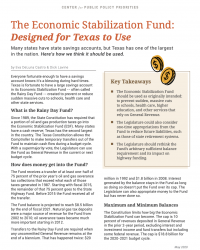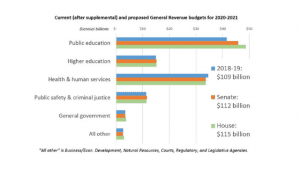
Economic Stabilization Fund
Texas has one of the largest state savings accounts in the country.
Often called the Rainy Day Fund, the Economic Stabilization Fund (ESF) functions like a savings account for the state of Texas, created to prevent or reduce sudden massive cuts to schools, health care and other state services.

Background
Though use of the Fund has sometimes been a point of contention, the Legislature has used the Fund frequently, both for one-time and ongoing budget items. Legislative approval by a three-fifths or two-thirds vote in the House and Senate is required to spend money from the Fund. The lower threshold applies when the Fund is used to eliminate a current-year revenue shortfall, such as the $3.2 billion appropriation made in 2011 for that fiscal year, but even that use was approved by the higher vote.
Previous Legislatures have spent the Fund on existing, ongoing costs—everything from public schools to criminal justice to Medicaid and the Children’s Health Insurance Program. The Fund has also been used for new budget items such as the State Water Plan, the Texas Enterprise Fund, and flood prevention and planning.
The following are common-sense situations when legislators should consider using the Fund:
- when needed to prevent state service cuts that further destabilize the economy and prolong a recession, such as teacher layoffs or nursing home closures;
- when one-time uses could prevent larger costs in the future, like unfunded state pensions;
- and when, like a household, dipping into savings will help the state get through a temporary shortfall.
The ESF is not designed to correct chronic underfunding of state services. If something needs additional funding in general, the Legislature should devise a way to provide permanent additional funding.
Our Staff

Dick Lavine
Senior Fiscal Analyst, Invest in Texas

Shannon Halbrook
Senior Fiscal Analyst, Invest in Texas

Samuel Cervantes
Analyst, Data & Policy


